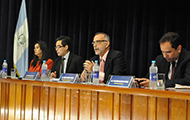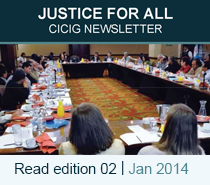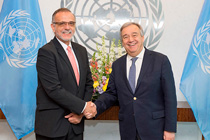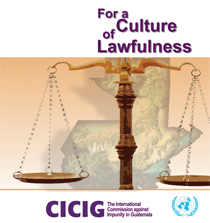PRESS RELEASE 019
FRAIJANES II CASE AT FINAL STAGES
 Guatemala, 2 June 2014. The Eighth Trial Court, CICIG, and the Public Prosecutor's Office (MP) presented their conclusions in the Fraijanes II case and requested a 4-year commutable prison sentence, and the ancillary penalty of prohibition from holding public office, for former Minister of the Interior, Raúl Antonio Velázquez Ramos, on charges of abuse of authority and noncompliance of duties. Velásquez Ramos failed to ensure compliance with the law, administrative probity, and the proper investment of public funds.
Guatemala, 2 June 2014. The Eighth Trial Court, CICIG, and the Public Prosecutor's Office (MP) presented their conclusions in the Fraijanes II case and requested a 4-year commutable prison sentence, and the ancillary penalty of prohibition from holding public office, for former Minister of the Interior, Raúl Antonio Velázquez Ramos, on charges of abuse of authority and noncompliance of duties. Velásquez Ramos failed to ensure compliance with the law, administrative probity, and the proper investment of public funds.
Furthermore, on the charge of noncompliance of duties, a 2-year commutable prison sentences and prohibition from holding public office were requested for employees of the Comptroller General's Office Francisco Javier Alvarado Cuadra, Luis Antonio Alvarez Pereira, Francisco Javier Villatoro Villanueva and Carlos Enrique López Gutiérrez. The evidence presented before the Court made it possible to reach the conclusion that the aforementioned individuals failed to report findings of the Government audit of the "Centro de Rehabilitación para Hombres Fraijanes II" project, which was implemented by the Fundación para el Desarrollo, Fundtech.
The Fraijanes II case concerns an agreement entered into between former Minister of the Interior Salvador Gándara and the NGO Fundtech, which subsequently contracted the company Serdiconstru to renovate the Fraijanes prison. Serdiconstru was contracted with the aim of benefitting the Lainfiesta group of enterprises.
The investigations revealed that there had been irregularities in procurement procedures and in the execution of the project, as well as in the actions taken by Fundtech and then-officials (2009) of the Ministry of the Interior.
The former Minister of the Interior Raúl Velásquez arbitrarily ordered the transfer of inmates to Fraijanes II prison; failed to verify fulfillment of MINGOB-DGSP-03-2009, a financial administration agreement; and signed ADDENDUM 02-2009 in order to extend the term and optimize the competiveness of allocated funding, thereby modifying the subject of the agreement.



 Guatemala, 2 June 2014. The Eighth Trial Court, CICIG, and the Public Prosecutor's Office (MP) presented their conclusions in the Fraijanes II case and requested a 4-year commutable prison sentence, and the ancillary penalty of prohibition from holding public office, for former Minister of the Interior, Raúl Antonio Velázquez Ramos, on charges of abuse of authority and noncompliance of duties. Velásquez Ramos failed to ensure compliance with the law, administrative probity, and the proper investment of public funds.
Guatemala, 2 June 2014. The Eighth Trial Court, CICIG, and the Public Prosecutor's Office (MP) presented their conclusions in the Fraijanes II case and requested a 4-year commutable prison sentence, and the ancillary penalty of prohibition from holding public office, for former Minister of the Interior, Raúl Antonio Velázquez Ramos, on charges of abuse of authority and noncompliance of duties. Velásquez Ramos failed to ensure compliance with the law, administrative probity, and the proper investment of public funds. 












